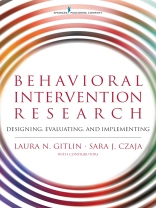“ I applaud [this] book for providing a much needed overview of the entire “behavioral intervention pipeline.” It fills a unique niche in its coverage of key theoretical and methodological aspects as well as its case examples and professional development considerations, which makes the content accessible and practical for a broad audience.”
–Marcia Ory, Ph D
From the Foreword
This unique text provides comprehensive coverage of one of the most neglected—yet vitally important–areas of public health research: developing, evaluating, and implementing novel behavioral interventions in service and practice settings. Written for Masters- and Doctoral-level courses as well as novice and expert researchers in this area, the book examines the most critical issues surrounding this form of research in order to maximize the ability of intervention researchers to successfully implement current and future evidence-based protocols in practice settings. Expert contributors embrace key challenges —the complexities of health care delivery, disease management and prevention, rising costs, and changing population demographics—in shaping the push toward advancing more efficient and effective behavioral interventions and methodologies.
Tackling numerous topics that have been neglected in traditional randomized trial handbooks, methodology texts, and books on dissemination and implementation science, the book addresses: ways to develop and advance an intervention, emerging hybrid trial designs – theories and new models for integrating behavioral interventions with implementation science – – recruitment and retention strategies for inclusion of diverse samples – research designs for different stages of intervention development – treatment fidelity models and measures – novel measurement and analytic strategies – cost analyses – selection of control groups – use of mixed methodology – ethics and informed consent – technology-based intervention approaches – professional considerations. Abundant case examples from successful behavioral intervention trials—both national and international–illustrate key concepts.
Key Features:
-
Includes examples of a wide range of interventions including individuals across the life span and of diverse communities and health systems
-
Replete with case examples from successful behavioral intervention trials
-
Presents the challenges of and strategies for advancing behavioral interventions for immediate use in practice
-
Written by world-recognized expert authors and contributors
-
Provides novel coverage of a great variety of important—but previously neglected–topics
Table des matières
Part One: Developing Interventions: Heart of the Matter
Chapter 1. Promises and Challenges of Behavioral Intervention Research
Chapter 2. Pipelines for Designing, Evaluating and Implementing Interventions
Chapter 3. Getting Started – Anatomy of the Intervention
Chapter 4. Theory: A Driver of Behavioral Intervention Research
Chapter 5. Delivery Characteristics of Behavioral Interventions
Chapter 6. Standardization
Chapter 7. The Use of Technology in Behavioral Intervention Research: Advantages and Challenges (Invited contributor, Dr. Berkowsky & Dr. Czaja)
Part Two: Evaluating Interventions: Attention to Design
Chapter 8. Selecting Control Groups: To What Should We Compare Behavioral Interventions? (Invited contributor, Dr. Rebok)
Chapter 9. Sampling Considerations: Identifying Appropriate Participants for Behavioral Intervention Research
Chapter 10. Recruitment and Retention: Two of the Most Important, yet Challenging Tasks in Behavioral Intervention Research (Invited contributor, Dr. Jimenez & Dr. Czaja)
Chapter 11. Mixed Methods in Behavioral Intervention Research (Invited contributor, Dr. Gallo & Dr. Lee)
Chapter 12. Are Treatment Effects Real? The Role of Fidelity (Invited contributor, Dr. Gitlin & Dr. Parisi)
Chapter 13. Ethical Considerations in Behavioral Intervention Research
Part Three: Do Interventions Work: Selecting Outcomes and Analytics
Chapter 14. Measurement in Behavioral Intervention Research (Invited contributor, Dr. Czaja & Dr. Loewenstein)
Chapter 15. Cognitive and Functional Outcomes: The Role of Objective Measurement (Invited contributor, Dr. Harvey)
Chapter 16. Statistics is not a Substitute for Solid Experimental Methodology and Design (Invited contributor, Dr. Savia & Dr. Loewenstein)
Chapter 17. Clinical Significance
Chapter 18. Economic Evaluations of Behavioral Interventions (Invited contributors, Dr. Pizzi, Mr. Jutkowitz & Dr. Nyman)
Part Four: Into the Real World: Implementation and Dissemination
Chapter 19. The Role of Implementation Science in Behavioral Intervention Research (Invited contributor, Dr. Hodgson and Dr. Gitlin)
Chapter 20. Lessons Learned from Implementing Proven Interventions into Real World Contexts (Invited contributor, Dr. Gitlin and Dr. Leff)
Chapter 21. Disseminating Proven Behavioral Interventions: What Does It Take? (Invited contributor, Mr. Beilenson, Dr. Gitlin & Dr. Czaja)
Part Five: Professional Considerations and Reflections
Chapter 22. Becoming and Being a Behavioral Intervention Researcher: What Does it Take?
Chapter 23. Grant Writing Considerations for Advancing Behavioral Interventions
Chapter 24. What to Publish and When: Being Productive While Awaiting Main Outcomes and other Considerations
Chapter 25. Synthesis and Future Directions
A propos de l’auteur
Sara J. Czaja, Ph D, is a Leonard M. Miller Professor of the Psychiatry and Behavioral Sciences, with joint appointments in Psychology and Industrial Engineering at the University of Miami. She is also the scientific director of the Center on Aging at the University of Miami Miller School of Medicine and the director of the Center on Research and Education for Aging and Technology Enhancement (CREATE).












